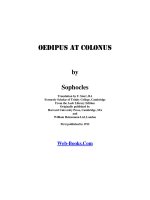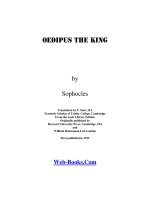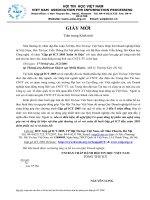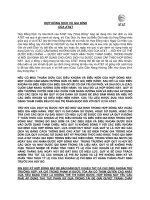Oedipus at Colonus
Bạn đang xem bản rút gọn của tài liệu. Xem và tải ngay bản đầy đủ của tài liệu tại đây (67.7 KB, 11 trang )
Oedipus at Colonus
by
Sophocles
Translation by F. Storr, BA
Formerly Scholar of Trinity College, Cambridge
From the Loeb Library Edition
Originally published by
Harvard University Press, Cambridge, MA
and
William Heinemann Ltd, London
First published in 1912
Web-Books.Com
Oedipus at Colonus
ARGUMENT
Oedipus, the blind and banished King of Thebes, has come in his wanderings to
Colonus, a deme of Athens, led by his daughter Antigone. He sits to rest on a rock just
within a sacred grove of the Furies and is bidden depart by a passing native. But
Oedipus, instructed by an oracle that he had reached his final resting-place, refuses to
stir, and the stranger consents to go and consult the Elders of Colonus (the Chorus of
the Play). Conducted to the spot they pity at first the blind beggar and his daughter,
but on learning his name they are horror-striken and order him to quit the land. He
appeals to the world-famed hospitality of Athens and hints at the blessings that his
coming will confer on the State. They agree to await the decision of King Theseus.
From Theseus Oedipus craves protection in life and burial in Attic soil; the benefits
that will accrue shall be told later. Theseus departs having promised to aid and
befriend him. No sooner has he gone than Creon enters with an armed guard who
seize Antigone and carry her off (Ismene, the other sister, they have already
captured) and he is about to lay hands on Oedipus, when Theseus, who has heard the
tumult, hurries up and, upbraiding Creon for his lawless act, threatens to detain him till
he has shown where the captives are and restored them. In the next scene Theseus
returns bringing with him the rescued maidens. He informs Oedipus that a stranger
who has taken sanctuary at the altar of Poseidon wishes to see him. It is Polyneices
who has come to crave his father's forgiveness and blessing, knowing by an oracle that
victory will fall to the side that Oedipus espouses. But Oedipus spurns the hypocrite,
and invokes a dire curse on both his unnatural sons. A sudden clap of thunder is heard,
and as peal follows peal, Oedipus is aware that his hour is come and bids Antigone
summon Theseus. Self-guided he leads the way to the spot where death should
overtake him, attended by Theseus and his daughters. Halfway he bids his daughters
farewell, and what followed none but Theseus knew. He was not (so the Messenger
reports) for the gods took him.
DRAMATIS PERSONAE
OEDIPUS, banished King of Thebes.
ANTIGONE, his daughter.
ISMENE, his daughter.
THESEUS, King of Athens.
CREON, brother of Jocasta, now reigning at Thebes.
POLYNEICES, elder son of Oedipus.
STRANGER, a native of Colonus.
MESSENGER, an attendant of Theseus.
CHORUS, citizens of Colonus.
Scene: In front of the grove of the Eumenides.
Enter the blind OEDIPUS led by his daughter, ANTIGONE.
OEDIPUS
Child of an old blind sire, Antigone,
What region, say, whose city have we reached?
Who will provide today with scanted dole
This wanderer? 'Tis little that he craves,
And less obtains--that less enough for me;
For I am taught by suffering to endure,
And the long years that have grown old with me,
And last not least, by true nobility.
My daughter, if thou seest a resting place
On common ground or by some sacred grove,
Stay me and set me down. Let us discover
Where we have come, for strangers must inquire
Of denizens, and do as they are bid.
ANTIGONE
Long-suffering father, Oedipus, the towers
That fence the city still are faint and far;
But where we stand is surely holy ground;
A wilderness of laurel, olive, vine;
Within a choir or songster nightingales
Are warbling. On this native seat of rock
Rest; for an old man thou hast traveled far.
OEDIPUS
Guide these dark steps and seat me there secure.
ANTIGONE
If time can teach, I need not to be told.
OEDIPUS
Say, prithee, if thou knowest, where we are.
ANTIGONE
Athens I recognize, but not the spot.
OEDIPUS
That much we heard from every wayfarer.
ANTIGONE
Shall I go on and ask about the place?
OEDIPUS
Yes, daughter, if it be inhabited.
ANTIGONE
Sure there are habitations; but no need
To leave thee; yonder is a man hard by.
OEDIPUS
What, moving hitherward and on his way?
ANTIGONE
Say rather, here already. Ask him straight
The needful questions, for the man is here.
[Enter STRANGER]
OEDIPUS
O stranger, as I learn from her whose eyes
Must serve both her and me, that thou art here
Sent by some happy chance to serve our doubts--
STRANGER
First quit that seat, then question me at large:
The spot thou treadest on is holy ground.
OEDIPUS
What is the site, to what god dedicate?
STRANGER
Inviolable, untrod; goddesses,
Dread brood of Earth and Darkness, here abide.
OEDIPUS
Tell me the awful name I should invoke?
STRANGER
The Gracious Ones, All-seeing, so our folk
Call them, but elsewhere other names are rife.
OEDIPUS
Then may they show their suppliant grace, for I
From this your sanctuary will ne'er depart.
STRANGER
What word is this?
OEDIPUS
The watchword of my fate.
STRANGER
Nay, 'tis not mine to bid thee hence without
Due warrant and instruction from the State.
OEDIPUS
Now in God's name, O stranger, scorn me not
As a wayfarer; tell me what I crave.
STRANGER
Ask; your request shall not be scorned by me.
OEDIPUS
How call you then the place wherein we bide?
STRANGER
Whate'er I know thou too shalt know; the place
Is all to great Poseidon consecrate.
Hard by, the Titan, he who bears the torch,
Prometheus, has his worship; but the spot
Thou treadest, the Brass-footed Threshold named,
Is Athens' bastion, and the neighboring lands
Claim as their chief and patron yonder knight
Colonus, and in common bear his name.
Such, stranger, is the spot, to fame unknown,
But dear to us its native worshipers.
OEDIPUS
Thou sayest there are dwellers in these parts?









